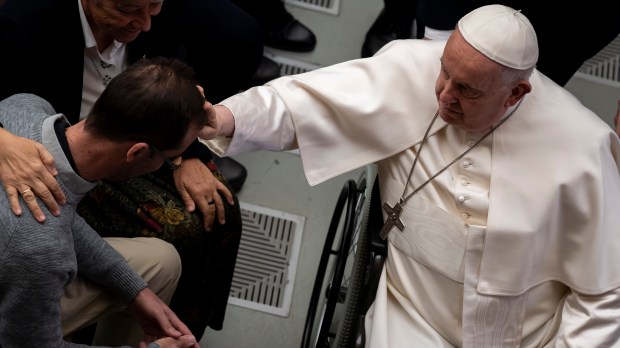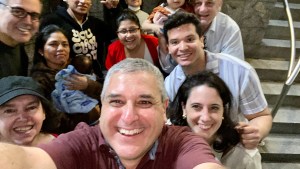Helping those who are vulnerable is not just about “organization of practices” but about staying “well anchored in the Gospel,” Pope Francis told participants of a formation course on taking care of the vulnerable, at the Vatican on March 1, 2024. In a speech that was read out by a secretary, as the Pope is still fighting a cold, he encouraged the participants to follow Jesus’ example by truly taking care of those who are vulnerable and not seeing them simply as a “category.”
“[Jesus] did not teach his disciples to make a care plan for the sick and poor. Jesus wanted to train the disciples in a way of life by being in contact with the vulnerable, in the midst of them,” the Pope said. “Vulnerability cannot be a ‘politically correct’ issue, or a mere organization of practices, however good.”
“I say this because unfortunately the risk is there, it is always lurking, despite all good will,” the Pope warned. “Especially in larger and more structured settings, but also in smaller ones, vulnerability can become a category, people become faceless individuals, a service, a ‘performance,’ and so on.”
The formation course, titled “Vulnerability and community, between welcome and inclusion” took place near Rome from February 27 to March 1 and was organized by the association “The Chair of Welcome.”
The course focused on the relationship between vulnerable people and the community they live in and how to help the needy to be included and empowered. The Pontiff praised the organizers for the course’s “rich and very interesting” program.
Vulnerable people are protagonists of the Gospel
To avoid seeing care for the vulnerable as a simple task one needs to do, the Pope highlighted the need to follow Jesus’ example. “The disciples saw how [Jesus] met people, saw how He welcomed them: His closeness, His compassion, His tenderness. And after the Resurrection, the Holy Spirit imprinted this way of life in them,” the Pope explained, underlining all the saints that have since dedicated their lives to those who are vulnerable.
The Pope also urged the participants to not see vulnerable people as “objects” but “subjects.” In the Gospel they “are protagonists together with Jesus in the proclamation of the Kingdom of God” and can then become examples for others in the community. He cited for example the healing of Bartimaeus, a blind man, as described in the Gospel of Mark, or Mary Magdalene who had seven demons driven out of her.
Firstly, the Pontiff told the participants that “in order to welcome vulnerable brothers and sisters [they] must feel vulnerable and welcomed as such by Christ.”
“He made himself vulnerable, until the Passion; he embraced our frailty so that, because of him, we can do the same,” the Pope insisted.


